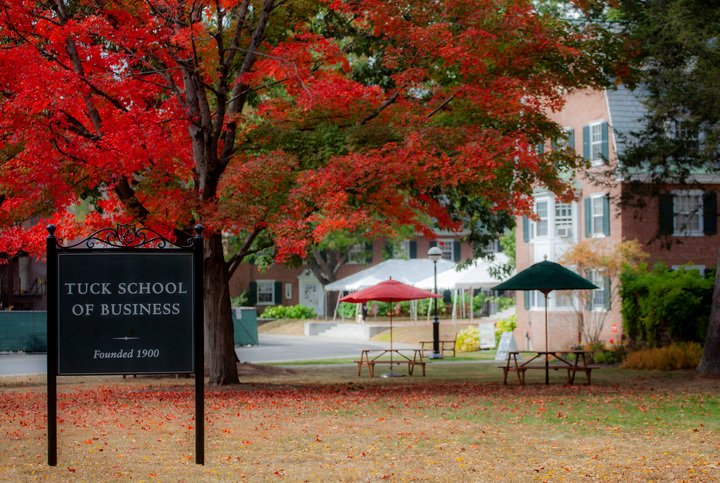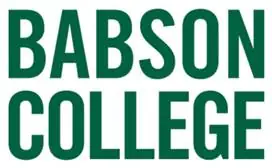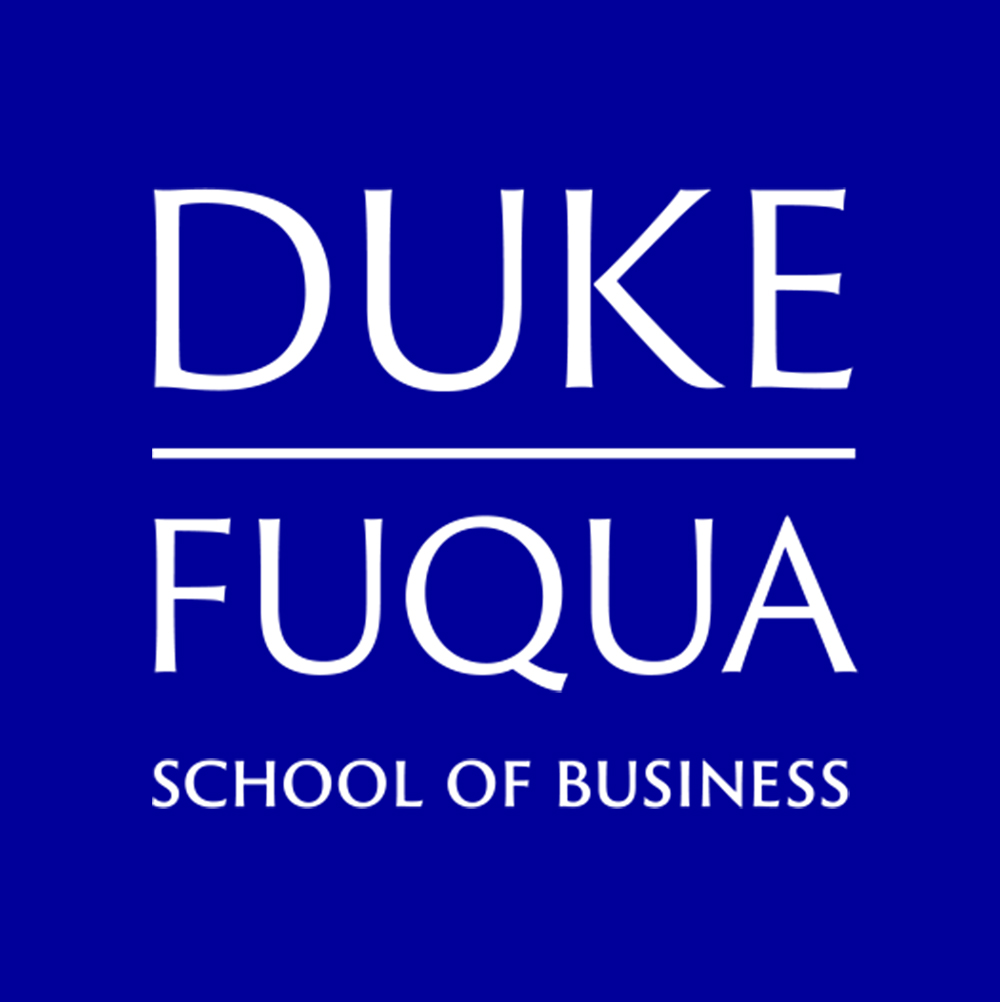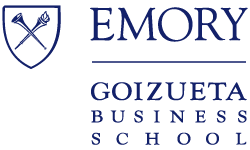[ad_1]

You hear the whispers. The cohort is too small. The town is too dull. The academics are too tough. You don’t know where these views come from. You don’t even know if they are true. But you do suspect what they mean…
This isn’t the school for you. You’d be happier somewhere else.
Call them myths: observations passed down online and orally over the years, author(s) unknown. They fulfill the need to make sense of a complex and contradictory world. Hypothetically, myths make it easier to organize information and spotlight key pieces. Functionally, they act as crutches, wayward symbols of unconscious bias.
Too often, they deter applicants from pursuing MBA programs that would fit them.

Tuck Campus
SMALL AND SECLUDED WINS OUT
Maybe the biggest myths surround location and climate. Big cities are associated with opportunities. Here, you’ll find most major companies maintaining some presence. Plus, these locales boast a surplus of industry and functional experts to serve as speakers, adjuncts, mentors, and partners. When it comes to conditions, who would want to take classes in a sun-drenched, breezy climates sandwiched between oceans and mountains? Such presumptions can make a college town like Hanover, New Hampshire a hard sell to some. After all, it is land-locked and rural – and frigid in the winter too. While Hanover is home to Dartmouth College’s Tuck School – a Top 10 program and Ivy League member – many applicants naturally wonder if they’ll miss out on the full MBA experience by choosing a rustic lifestyle.
Count Destinée Mentor-Richards among them. After working in New York City and St. Louis, she was skeptical of the great outdoors – not to mention winter and cold. On top of that, Mentor-Richards had only finished two hikes in her “entire” life. However, she notes, Tuck’s “outdoorsy” setting fosters a mindset where the students were “Immersed and invested in the MBA experience.” More even, it creates opportunities for students to connect more deeply.
“The truth is that while the Upper Valley does attract many students that love the outdoors, many students were just like me—learning to ski for the first time or never having hiked or ice skated,” she explains. “The beauty of Tuck is that the people that do love these activities are often the first to bring along others to experience them for the first time. And, even if you choose not to participate, there are tons of other programming and activities on and off campus that you can engage in.”
That’s the essence of business school myths. Often, they amplify one aspect of a program. While they may signify a step back to some, they often represent a differentiator to many others. Which myths surround which schools – and how accurate are they? This spring, we ask the Best & Brightest MBAs and MBAs To Watch from over 70 programs about the myths they’d heard about their programs. In some cases, these spring graduates quickly dispelled the rumors. Other times, they clarified the myths – or outlined why it was actually a cultural touchstone or strategic advantage.
What’s true and what’s distorted? From Arizona State to Yale SOM, here is what MBAs heard about their alma maters going in – and what they know coming out.

Myth: Arizona State it is essentially a supply chain school.
Reality: “While I have loved studying supply chain at W. P. Carey, I have seen students majoring in different concentrations succeed in their careers. Students majoring in finance have landed jobs at Amazon, Intel, and P&G, while marketing majors have found opportunities with Walmart and eBay, among others. Of late, W. P. Carey has also established an excellent reputation among consulting firms. From the class of 2022, almost a quarter of the students found opportunities at major consulting firms, including McKinsey, EY-Parthenon, and Deloitte.”
Rishabh Kakkar, Arizona State (W. P. Carey)

Myth: Babson College is only for entrepreneurs or people who want to work in family business.
Reality: “Babson is known across top corporations for producing top talent in a variety of industries. This is due to the unique approach the college takes in equipping students with an entrepreneurial mindset, focus and problem-solving skills with limited resources and a creative approach to finding solutions. These skills are highly desirable across all organizations.”
Abhishek (Abby) Dudhankar, Babson College (Olin)

Myth: “Tepper is a quant heavy school.”
Reality: “There is some truth to that. Before class gets underway for new first year students, they are expected to attend a math skills workshop during basecamp to brush up on some calculus skills needed for “Managerial Economics” and “Optimization”. There’s no need to be intimidated by these courses. The collaborative culture and grade nondisclosure policy fosters an environment where it is safe to challenge yourself academically. Additionally, there are plenty of opportunities to flex your “soft skills” with Acting for Business, Negotiations, Organizational Power and Influence, and many others.”
Christopher Elston, Carnegie Mellon (Tepper)

Myth: Chicago Booth has a reputation for being a school purely for quants where “every class would be bursting at the seams with differential equations, charts and graphs, and complicated Excel formulas.”
Reality: “I’ve been delighted to find that this couldn’t be further from the truth. In addition to extensive socializing and community-building events, I’ve enjoyed courses that are highly qualitative – courses like Interpersonal Dynamics, which features T-groups and self-reflective journaling that radically alter people’s lives, or Leadership Studio, which uses artistic metaphors and theatrical experiences to bring out our authentic and dynamic leadership styles.”
Jeff Yao, University of Chicago (Booth)

Myth: Columbia is a highly competitive setting, more geared towards students pursuing careers in finance.
Reality: “Prior to my enrollment in CBS, I had heard that it was a highly competitive setting, more geared towards students pursuing careers in finance. However, upon meeting my peers, I discovered that they were some of the most cooperative and amiable individuals I had ever encountered. We all share a strong drive and a vested interest in each other’s accomplishments. Although CBS is renowned for its finance program, I have personally found its curriculum and recruitment standing across several industries such as beauty, media, and tech to be quite formidable.”
GT Svanikier, Columbia Business School

Myth: Cornell Johnson is a finance school.
Reality: “This is not entirely a myth, as we have a remarkable track record in investment banking recruiting, owing to the Old Ezra Finance Club, the Career Management Center, and a robust Investment Banking Immersion.
However, this is only part of the picture, as we also excel in consulting recruiting. In our class, 35% of students were placed in consulting, with more than 13% going to McKinsey & Co. The vast majority had no prior consulting experience, and very few if any were sponsored by consulting companies to begin with. This is an impressive result that should not be overlooked by prospective candidates who are interested in a post-MBA career in consulting.”
Calvin Tong, Cornell University (Johnson)
Myth: Since Cornell is based in the small town of Ithaca, there’s nothing to do.
Reality: “This is false. You constantly feel like there’s not enough time to do all the things you want to do, between student club events, small-group networking, Cayuga Lake outdoor experiences, or winery tastings. The small-town setting lets you make your own fun as well. A favorite is block parties with themed houses students can hop around to. Ithaca is a college town and has a bar scene, but the myth stems from how it doesn’t compare with the nightclub scene many of us are familiar with in large cities. The proximity to New York City also allows us to supplement our MBA with the Cornell Tech NYC campus and their many offerings”
Monica Mercado, Cornell University (Johnson)

Myth: Everyone at Tuck goes into consulting or finance.
Reality: “While it is true that those are the majority, I have found there is a strong Tuck community of folks doing “non-traditional” recruiting, and that Tuck has quietly but effectively turned into a tech recruiting hub. Personally, I have immersed myself fully in all the tech resources and opportunities while at Tuck—the Center for Digital Strategies, Tech Club, the strong alumni community, Career Services, and speaker events on campus – just to name a few. Tech academic offerings are also growing, including Product Management in Tech and Digital Change Strategies courses, and all the core courses are incorporating tech-focused case studies. I even had the opportunity to go to the CES conference in Las Vegas this past January through the Center for Digital Strategies, which was very productive and enlightening. My hope is to continue to have an impact on Tuck becoming a tech magnet and for more students to understand the career possibilities in this space while at Tuck.”
Carly Wolberg, Dartmouth College (Tuck)

Myth: Team Fuqua is a slogan.
Reality: “You hear about [Team Fuqua] almost immediately from students, alumni, admissions, and any member of the community. On the surface, I can imagine that it might be interpreted as clever branding and marketing. But, when you dig into how Fuqua structures the business school experience, it really is more than just a slogan.
Team Fuqua means being a part of a section of students who take core courses together, having a smaller C-LEAD team to collaborate with on projects and assignments, and the teamwork that comes with extracurricular activities. For me, Team Fuqua also means that when my partner had to fly back to Colombia on my first day of school, my C-LEAD members were there to take my dog on walks when I could not be there. Team Fuqua is the weddings, tailgates, and birthdays we have celebrated together (truly, we are talking about the witnesses on the wedding certificate!). It is the travel and meetups around the world. It is the FaceTime calls made to do mock interviews together. Team Fuqua is so much more than a slogan; it is the diversity of thoughts, experiences, and identities that connect and show up for one another in big and small ways.”
Andrew Fischer, Duke University (Fuqua)

Myth: Emory Goizueta is too small.
Reality: “Many people view Emory’s Goizueta Business School as “too small.” I must say, however, that class size is the magic to Goizueta. I’ve found that the number of people in my class is both large enough to feel my own perspective broadening but small enough that I have personal relationships with almost everyone. I can’t imagine going to a school where I wouldn’t know the person sitting next to me in class. The relationships I’ve made at Emory will last far beyond business school. Goizueta’s size not only fosters a close-knit class, but it also allows for deeper student-faculty relationships. Being on a first name basis with our Dean or chatting with a professor after class makes it feels like Emory cares as much about me as I do it.”
Madeline Davis, Emory University (Goizueta)
Next Page: Myths about INSEAD, MIT Sloan, NYU Stern, and more….
[ad_2]
Source link

Comments or questions about this article? Email us.